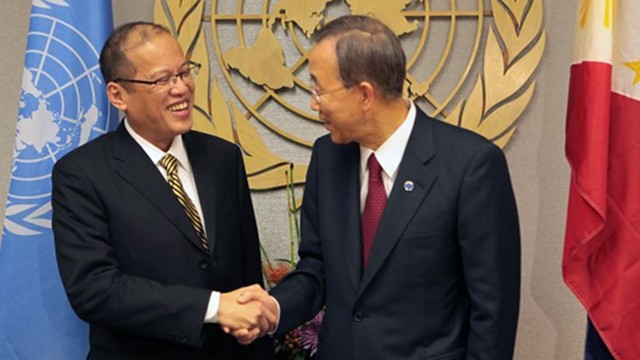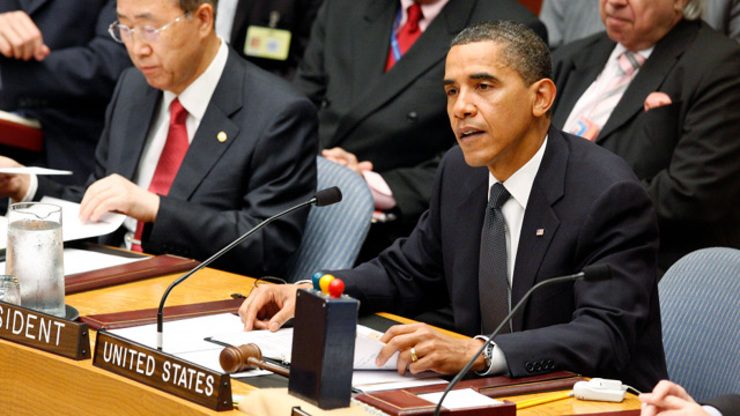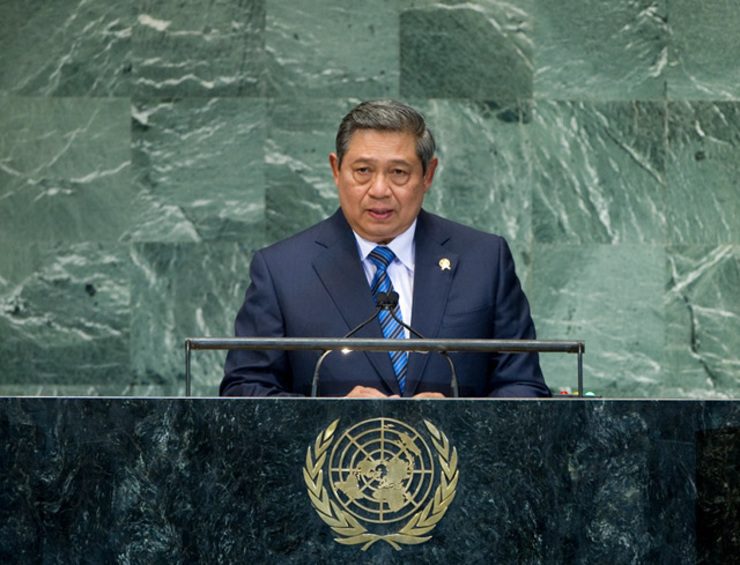SUMMARY
This is AI generated summarization, which may have errors. For context, always refer to the full article.

UNITED NATIONS – Nearly 200 world leaders in a single gathering, a flurry of bilateral meetings, rants of colorful dictators, and the occasional walkouts – the United Nations’ annual meet is considered global diplomacy’s busiest week.
Yet this year’s UN General Assembly (UNGA) opening on September 16, Tuesday, is shaping up to be one of the most eventful in the world body’s 69-year history. With multiple crises jostling for news space and the world’s attention, heads of state and diplomats will be swamped discussing problems ranging from terrorism, climate change, Ukraine, Gaza to Ebola, and more.
President Benigno Aquino III, United States President Barack Obama, and their counterparts will take the lectern at the UN Headquarters in New York during what Secretary General Ban Ki-Moon calls “an intense, important year” – 2015 is the year of deadlines for major global initiatives and the UN’s 70th anniversary.
There are also controversial figures debuting on the world stage, notable snubs, and graduating politicos. Here are 5 things to expect from the UNGA and parallel high-level meetings, and why these matter to the Philippines and Southeast Asia.
1. Aquino to demand climate justice from top polluters
Even before leaders express their views on various issues in the so-called General Debate, Ban set aside one day for them to focus on “the defining issue of our times”: climate change.

The leader of the nation battered by the world’s most powerful typhoon Haiyan (local name: Yolanda), Aquino will address the UN Climate Summit on September 23. He will call on top polluting countries to own up to their responsibility to reduce greenhouse gas emissions, and to help developing countries bearing the brunt of the crisis by providing funds and technology.
The summit marks the first time in 5 years that world leaders will meet on climate change. Ban invited them to make “bold announcements and initiatives” to support separate negotiations to craft by 2015 a treaty that will limit the increase in global temperature to two degrees Celsius, a benchmark scientists set to avoid the dangerous effects of climate change.
While Obama is expected to attend the summit, Bloomberg reported that the leaders of China and India, two other top global emitters, will skip the event.
Naderev “Yeb” Saño, the Philippines’ Climate Change Commissioner, told Rappler that the summit comes at a crucial time, but there is no sign so far that the biggest polluters will agree to specific, ambitious, and concrete targets.
“This is really worrying, especially from the perspective of the Philippines being one, if not the most vulnerable country to climate change. Failing to meet the two degrees target and failing even to come up even with a robust agreement by next year is really condemning countries like the Philippines to a very dreadful future,” Saño said.

2. Obama takes ISIS strategy to Security Council
In another rare event, President Obama will preside over a meeting of the UN Security Council for the first time since 2009. As the General Debate starts on September 24, Obama will take a seat at the council’s iconic horseshoe table to draw high-level attention and action against foreign terrorist fighters.
Two weeks after laying out his strategy against the Islamic State of Iraq and Syria (ISIS), Obama will use the US presidency of the council this month to push for a resolution to stop foreign jihadis from going to and returning from ISIS strongholds in Iraq and Syria.
A draft resolution obtained by Rappler calls on the UN’s 193 member states to prevent the transit of individuals associated with Al-Qaeda, to require airlines to provide advance passenger data of terrorists, and to counter extremism and the use of technology for terrorism. The resolution is not expected to meet any objection.
It will not suffice if it is the United States and just the few partners who have stepped up at this point dealing with this threat. We need all hands on deck.

– US Ambassador to the UN Samantha Power on ISIS
The issue is relevant not just for the 15-member council. In Southeast Asia and neighboring Australia, some local terrorist leaders already pledged allegiance to ISIS. Rappler earlier reported that at least two Filipinos, 50 Indonesians, about 20 Malaysians, and 200 Australians went to Syria to join ISIS.
Leaders fear these fighters will return and lead terror attacks in their home countries, like how Afghan veterans carried out Asia’s 9/11, the 2002 Bali bombing.
“It will not suffice if it is the United States and just the few partners who have stepped up at this point dealing with this threat. We need all hands on deck,” said US Ambassador to the UN Samantha Power.
3. After 2015, what’s next for development?
This year’s UNGA has the theme “Delivering on and Implementing a Transformative Post-2015 Development Agenda.” The UN’s chief policymaking and representative organ will negotiate the successor to the 8 Millennium Development Goals (MDGs), a 15-year roadmap to fight poverty, hunger, and disease set to expire in 2015.
The General Assembly will consider the draft 17 Sustainable Development Goals (SDGs), which built on the MDGs by including issues like energy, inequality, access to information and reducing corruption, and climate change.
The Philippines’ 5th Progress Report on the MDGs shows that Manila is on track to meet goals on providing universal access to primary education, reducing infant mortality, and increasing access to safe water supply.
The UN Development Programme though said that the country has “disappointing misses” in improving maternal health, access to Reproductive Health, and fighting HIV/AIDS. (READ: Q and A: ‘Glass ceiling, not brick wall, for PH women’)
4. Putin a no-show; Poroshenko, Sisi, and Modi first-timers
Facing increasing international isolation, Russian President Vladimir Putin is snubbing the UNGA altogether. Russia is only sending a minister after Moscow drew criticism and sanctions for annexing Crimea, and for invading eastern Ukraine, a charge Russian officials deny.
In contrast, Ukraine’s new president, Petro Poroshenko, is expected to appeal for support from the international community in the face of Russian aggression. Other UNGA first-timers include Egypt’s President Abdel Fattah al-Sisi and Indian Prime Minister Narendra Modi.
Egypt’s ties with the US became tense over the Sisi government’s fierce crackdown on the Muslim Brotherhood, and questions about its human rights record as seen in the widely condemned 7 to 10-year sentence for Al Jazeera journalists. Modi’s visit is his maiden trip to the US since Washington denied him a visa in 2005 for the 2002 religious riots in Gujarat where he was chief minister.

5. Yudhoyono’s last general assembly
From the Middle East, both Israeli Prime Minister Benjamin Netanyahu and Palestinian Authority President Mahmoud Abbas will address the assembly after the devastating 50-day war in Gaza, anticipated to be a highlight of their speeches.
Another global hotspot, North Korea, is sending a foreign minister, Ri Su-yong, to the annual meeting for the first time in 15 years. Analysts see the unusual trip as part of Pyongyang’s aggressive diplomatic campaign to reach out to the world after its relations with China soured.
In Southeast Asia, Indonesia’s President Susilo Bambang Yudhoyono will deliver his last UN address as president, with President-elect Joko Widodo taking over in October in the first transfer of power from a directly elected leader in the world’s largest Muslim majority nation.
A co-chair of the High-Level Panel on the Post-2015 Development Agenda, Yudhoyono is expected to discuss his global contributions as what Australian media calls “the most influential foreign policy figure in Southeast Asia.” – Rappler.com
Rappler multimedia reporter Ayee Macaraig is a 2014 fellow of the Dag Hammarskjöld Fund for Journalists. She is in New York to cover the UN General Assembly, foreign policy, diplomacy, and world events.
Add a comment
How does this make you feel?
There are no comments yet. Add your comment to start the conversation.